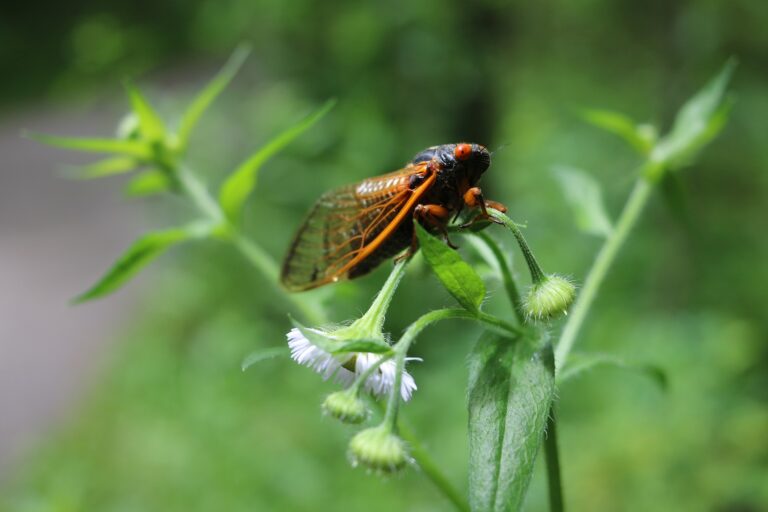St. Louis is dealing with an influx of Brood XIX cicadas, a 13-year-period cicada breed. These insects are causing extremely loud noises that could be harmful to human ears. They are making louder sounds than some of the loudest daily noises in the city.
Evaluating the Noise Levels
A regional news team used a decibel to measure the noise made by the cicadas. The readings showed sound levels from upper 80s to middle 90s decibels (dBA), even reaching beyond 94 dBA for some peaks. Here’s what they found,
- Trees full of cicadas, consistently recorded from upper 80s to middle 90s dBA.
- Fancy fountain at Delmar Gardens, less noisy than the cicadas.
- A passing heavy truck on U.S. Interstate 64, less noisy than the cicadas.
- MetroLink train at UMSL, less noisy than the cicadas.
- Riding lawnmower in Chesterfield, Similar but louder only at a close distance.
It has been noted that long-term exposure to sounds above 85 dBA can cause lasting damage to be hearing. So, these cicadas create a genuine danger.
Witness Accounts
Chesterfield man Jeff Presson who was mowing his lawn testified about the number of cicadas. “They’re really bad,” he said, adding that he had around 50 on him while cutting grass earlier despite wearing a hoodie sweatshirt in 90degree weather. Residents say their everyday lives have been affected by these insects as well.
For instance, Susie Kalinowski who recently went on a class outing with her children at Faust Park, revealed that they couldn’t escape their noise even in their home. “Everywhere you go in my house, you hear them… all the windows closed, air conditioning on, dogs barking, children running around you hear them!”, she shared.
Expert Insights
Expert Dr. Gene Kritsky from Mount St. Joseph University gave his insight on these cicadas’ noise levels. He stated their volumes had previously reached a maximum of 96 decibels and reassured residents that the current loudness will end soon. According to Kritsky, “It’s reaching the top… it won’t be as loud after another week.”
However, at present, Faust Park’s loudest sound wasn’t coming from cicadas but from kids of St. Gerard Class of 2024 mimicking those sounds.
Making Sense of Cicada Noise
Unbearable Cicada Sounds
The recurring cicadas known for emerging every 13 or 17 years make deafening mating calls. These mating sounds come from a drum-like part in their bodies called tymbals and can reach up to 90 dBA similar to a motorcycle or lawnmower.
Different Genres for Different Species
There are three types of “17year” cicadas,
- Magicicada cassini, makes a loud sound with many clicks followed by an increasing buzz.
- Magicicada septendecula, Creates several buzzing sounds that transition to lisps.
- Magicicada septendecim, recognized for its wolflike sound resembling a whistling kettle.
These species together emit a mixture of sounds making it impossible to ignore them.
Effects Of Cicadas on Everyday Living
People living in areas affected by cicadas are encouraged to take care if they find the noise intolerable. Using earplugs or earmuffs can help to lessen the noise.
Decoding the Cicada Sound
Cicadas produce noises by using their ribs. They make a clicking series of noises by folding and unfolding their ribs, which vibrate through the tymbals in their bodies. This complex action results in very loud sounds that travel long distances.
When Will the Noise Calm Down?
Right now, the cicadas are very active, but the noise levels should start dropping within a week. However, they will go on singing and mating for several more weeks until the female cicadas lay eggs to mark the end of this cycle.
Action To Take for Future Cicada Meetings
While you won’t see 17year cicadas until 2041, various other types such as Linne’s cicada, dog-day cicada, lyric cicada and scissor grinder cicada will pop up every summer and be heard in various regions like Chicago.
Ending Thoughts
As Brood XIX cicadas reach their loudest stage in St. Louis, they are competing with some of city’s noisiest sounds. Even though these insects can be irritating they play an important role in our ecosystem. Residents have been advised to protect themselves against high decibel levels as those sounds will drop over next few weeks.










+ There are no comments
Add yours